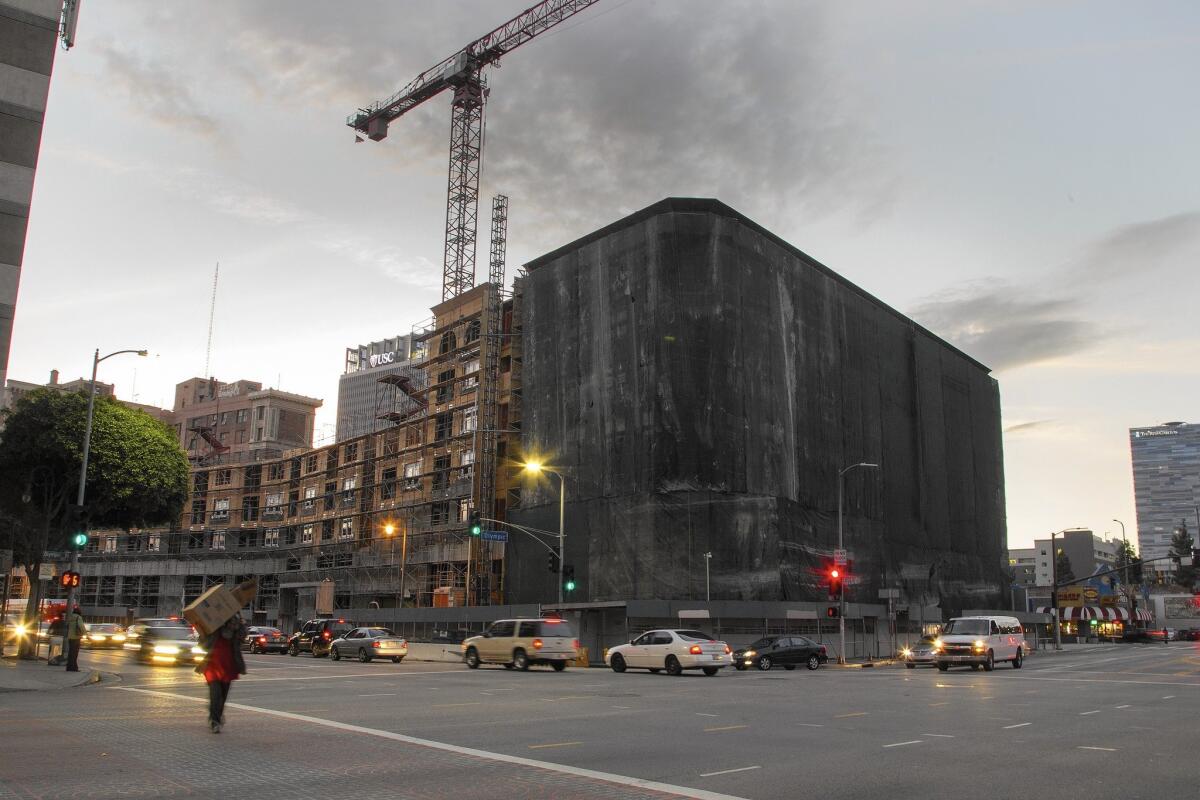L.A. developers grapple with affordable-housing measure passed by a wide margin

- Share via
Amid a Los Angeles building boom, voters this week overwhelmingly approved new labor and affordable-housing requirements for developers, who have warned the rules could be costly and crimp construction.
Measure JJJ, which passed with nearly 64% of the vote, requires developers to pay higher wages and build below-market rate units if they get exemptions from key planning rules — a common occurrence in Los Angeles, where the city’s zoning is considered outdated.
The measure was pitched by advocates as a way to add more affordable housing in an already expensive city where many new apartment and condo projects are aimed at the luxury end of the market.
But opponents, led by development interests, argued the proposed regulations, however well-meaning, would have the unintended consequence of reducing housing production and worsening the affordability crisis.
In particular, they raised concerns over the effect on small developments, because those projects often don’t command the higher return of larger ones, which often already use more expensive union labor.
Al Leibovic is one of those developers and builds small apartment buildings in the San Fernando Valley.
He previously told The Times that if the measure passed he wouldn’t build projects with fewer than 25 units that required exemptions — which many do. But after further running the numbers with his development team, he’s now worried about larger projects as well.
“This is pretty devastating,” he said. “It really throws all of our plans to construct an additional 700 units in the city of L.A. into question.”
Olson Co., a larger Seal Beach-based home builder with projects across Southern California, has a more positive outlook.
Chief Executive Scott Laurie said his company “wants to be in Los Angeles” and will try to make projects work despite the new requirements.
Still, he’s worried many projects might not be financially viable if land prices continue to rise as they have during this development boom.
“We will be in Los Angeles as long as we get a return,” said Laurie, who is building a 29 town home project in Highland Park. “If the land price doesn’t change, I don’t think you will make it.”
Backers of the measure disputed that construction would decline and indeed argued that the development restrictions would drive land prices down, allowing developers like Laurie to afford the new rules.
But even if land values declined, it isn’t clear that construction could continue at the same pace.
Kevin Farrell, chief operating officer of Century West Partners, which is building about 1,000 apartment units in Los Angeles, said that many landowners are selling only because property prices are up.
“If a guy thought his land was worth $10 million and now it’s worth $6 million, they are not going to say sure $6 million. They will say screw it and will wait,” he said.
The measure applies to projects with 10 units or more for which developers seek a zoning change, general plan amendment or height-district change — essentially to build more units than allowed or to build them where they currently can’t be located, such as a parking lot or industrial neighborhood.
Developers of those projects would then have to include a certain number of below-market units in their buildings, hire some local workers and pay wages set by a city agency, which developers worry will be equivalent to what is required for public projects.
Farrell said his company hasn’t sought the types of exemptions targeted by JJJ but had looked at doing projects that required them prior to the election. “We wouldn’t now,” he said.
Supporters of the measure, which included an alliance of labor, tenant and housing advocacy groups, disputed construction will fall.
“Now the city’s majority — working Angelenos who have been anxious for solutions to the crippling housing crisis facing our city — raised their voices in support of good housing and jobs policy,” said Laura Raymond of the Alliance for Community Transit – Los Angeles. “This will mean thousands of families will have access to safe, stable homes and good, local jobs.”
Beyond the dispute over the measure’s effect on construction, other uncertainty exists as well. It includes just how many projects submitted prior to Tuesday will not be subject to the new rules and grandfathered in.
For months, companies have rushed to file proposals with the city, fearful over JJJ, as well as an upcoming March ballot measure that would temporarily bar the same sort of projects affected by JJJ.
Edward J. Casey, chairman of the L.A. Area Chamber of Commerce’s land-use committee, said projects whose applications are already deemed complete — even if they are not yet approved — should be exempt from the new rules.
But what exactly makes an application complete is an “evolving area of the law,” the land-use attorney said.
“That will probably be one of the first court fights,” Casey said.
Ken Bernstein, a principal city planner, said the planning department is working with the city attorney to decide which projects would be grandfathered in.
Follow me @khouriandrew on Twitter
ALSO
Success of homelessness and transit measures could give L.A. Mayor Eric Garcetti a boost
California official calls Trump’s new hard-line immigration advisor ‘troubling’
Gov. Jerry Brown warns Trump that California won’t back down on climate change
UPDATES:
4:20 p.m., Nov. 10: This story has been updated to include comment from the measure’s backers and additional analysis.
This article was originally published Nov. 9 at 7 p.m.
More to Read
Inside the business of entertainment
The Wide Shot brings you news, analysis and insights on everything from streaming wars to production — and what it all means for the future.
You may occasionally receive promotional content from the Los Angeles Times.











